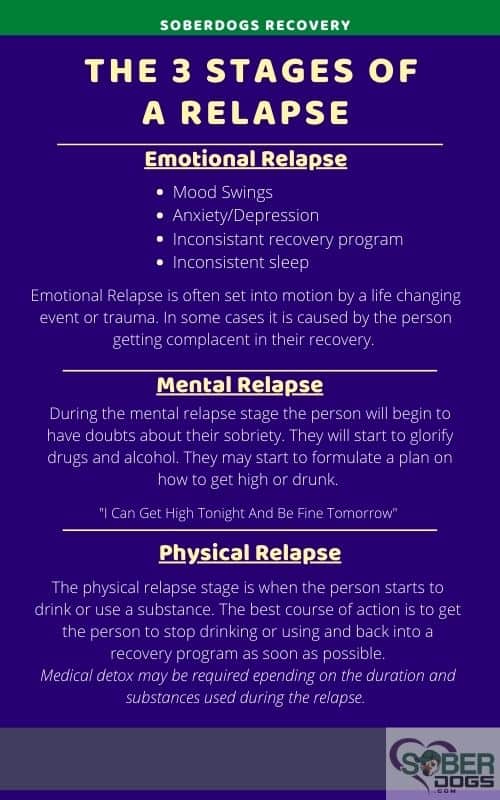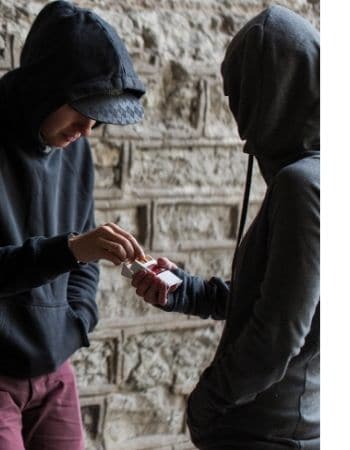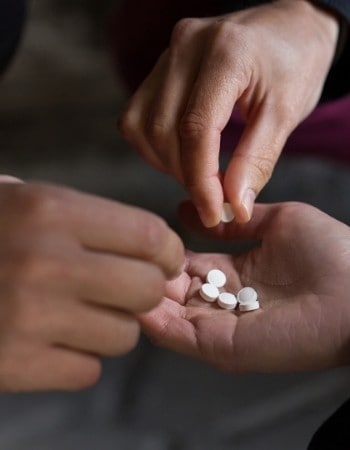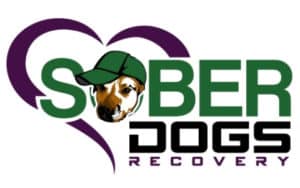I always assumed relapse was when someone said “screw it, I’ll have a drink too.” The person just had a weak moment and gave in to their cravings, right? The more I have dug into the act of relapsing and have studied my own relapses, I see the whole process of how relapse works. Even a situation that may seem spontaneous, will most likely have started well before that day.
Everyone in recovery will have cravings and urges at some point in time. The better we can understand the process of how relapse works the better prepared we can be for when the situation arises. Both of my relapses seemed spontaneous to me at the time, but now I can see that I was in relapse mode for months leading up to the actual event of getting high. Learning the signs and stages of a relapse is the key to stopping the relapse process.
The Stages of A Relapse
Relapse is not a single event of picking up a drink or drug. Relapse is a process that can start days, weeks, or even months before a person physically uses a substance. Relapse can be broken down into 3 main stages (source):
-
Emotional relapse
-
Mental relapse
-
Physical relapse

The relapse process can be set into motion by any number of events. It is often started by some form of complacency in the person’s recovery program. The relapse process progresses differently for every individual. Some people may go from emotional relapse to actually picking up a drink in a few hours while others may take months. It is often difficult to distinguish exactly when a person goes from one stage to the next.
Understanding relapse is a process that plays out for weeks or months is a huge part of understanding what is going on in the mind of an addict on the verge of relapsing. Knowing that relapse happens over a period of time is a huge benefit for the family and friends of people in recovery. If we can spot the signs and symptoms of relapse in the early stages we can break the cycle. I can look back on my relapses and see dozens of red flags.
Emotional Relapse
This is the first stage of relapse. Emotional relapse can start months before the actual process of getting drunk or high. The warning signs to watch out for during this stage are:
-
Mood Swings
-
Inconsistent Recovery Program/ Complacency or Overconfidence About Their Recovery Program
-
Not Taking Care of Mental Health
-
Anger/ Outbursts
-
Isolation
-
Depression/Anxiety
-
Inconsistency With Physical Health (Sleeping Patterns Off, Eating Patterns Off, Exercise Routine Off)
Knowing these signs can help to get a better understanding of the addict’s mindset before a relapse. The person wants to stay sober, but something has caused them to began to slip. A major life event, a bad day, or just general complacency may be the cause of this beginning stage of relapse.

The tricky issue for family and friends during this stage is figuring out whether these symptoms are a signal of relapse or PAWS symptoms. Most addicts will have at least 2-3 of these symptoms during early recovery, which doesn’t automatically indicate a relapse coming. I would recommend paying attention to the symptoms such as mood swings, isolation, and anxiety, combined with a downward trend in their recovery program.
Emotional Burnout
One of the most common reasons emotional relapse symptoms start is burnout. Many addicts in early sobriety will try and do 10 things at once to rebuild their lives. They feel guilty about the damage they’ve caused. To make up for this many addicts will try and fix everything at once, which is completely unrealistic.
The person will often feel like they’re trying so hard to rebuild everything but things are not falling into place quickly enough. This can lead to a defeating attitude. You may hear them say something along the lines of:
“I completed rehab, go to work, and have been doing everything I’m supposed to but I can’t catch a break”
We need to have patience during recovery. Everyone involved needs to be patient. We spent years, sometimes decades destroying our lives in active addiction, it’s going to take years to rebuild our lives. Here are some great tips on Rebuilding your life in recovery.
Mental Relapse
During the mental relapse stage, the mind games start to really ramp up. The person will most likely be going back and forth in their own head about getting high or drunk. Those evil thoughts of “I think I can Just Have A Few, I Can Just Get High Tonight and Be Fine Tomorrow” will constantly be on their mind. Whenever this thought comes up the person will try to battle it with what they’ve been taught in rehabs or 12-step meetings.
If a person can reach out for help during this stage, they have a great chance of getting back on track without physically relapsing. Unfortunately, many of us don’t realize the true extent of the situation at this time. I was telling myself “It’s just a craving, that’s totally normal and you fight it”. I didn’t understand the difference between a craving and the beginning stages of a relapse. It may be a craving or signs of relapse, either way, asking for help is the best option. More info on the early signs of relapse – Drug Relapse – The early Warning Signs.
As the mental relapse mind games start to get worse in the addict’s mind they will start to think about and play out scenarios of getting high. Typically they’ll begin to revert to old behaviors. Some of these thoughts may include:
-
Thinking About Old Friends They Used To Get High/Drunk With
-
Trying To Remember Dealers That Are Still Selling
-
Planning On How To Get High Without Getting Caught
-
Thinking About How Much Money They Can Afford To Spend On A Binge
-
Glorifying The Good Times, Downplaying The Bad Times
-
Assuming They Have Recovery All Figured Out
The human brain has a great way of forgetting painful memories and situations. This is great for someone trying to overcome past trauma, not so great for a person in the middle of a relapse. Our disease is telling us all the different ways we can “get high” without any consequences. When we stop fighting these thoughts is when we know the mental relapse stage is progressing into physical relapse.
Most addicts can look back on their relapses and see the progression of their thought process during the mental relapse stage. In the beginning, they’re still trying to fight the urges and do the right thing. At the end of this stage, they’re planning on how to not get caught.
I remember my own thought process during this stage. Initially, I was dead set against using anything. As the process went on and I refused to reach out for help I began to play out scenarios in which I could get high or drunk. Where could I go for a whole day with no one around? Who could I call that would get high with me? How could I do it without getting caught? All these thoughts went from being totally unacceptable to completely realistic situations in my own head. Once they began to form a plan on how to get high or drunk, it’s like a runaway freight train picking up speed.
Physical Relapse

” Ok I’m going to get high, watch out for cops”
“Put your phone on vibrate so no calls will distract you and try to change your mind”
“Don’t look at your phone, it will just make you feel guilty”
” I wonder which dealers are still around and who has the best stuff in town right now”
It’s beyond scary when I think about my actions and thoughts during physical relapse. My old behaviors and actions came back in the blink of an eye and were stronger than ever. It only took about 2 minutes to go from contemplating, right into a full-blown relapse. Within 4-5 seconds of getting high, everything I had been taught and told was cleared from my brain.
If the process is not broken before physical relapse, major damage typically follows. The emotions swirling around in the addict’s head will be all over the place. Extreme guilt and shame about relapsing will typically be the most powerful feelings. To get an inside look at exactly How Addicts Feel When They Relapse check out this article.
Addiction Is A Progressive Disease
“Your diease is outside doing pushups, waiting for you to relapse”
I’ve always heard that addiction was progressive but never understood the true depth of that statement until my relapses. During my addiction, it took years for my tolerance to build up to the point of doing more than 10 bags of heroin a day. By the 4th day of my relapse, I was back to using 10 bags a day. My addiction and tolerance had not only picked up where they were a year prior but the timeline had excelled. That is truly scary.
When a person relapses and picks up where they left off everything is amplified. Their tolerance is higher, and that means they need to do increasingly desperate acts for money and drugs. The consequences progress along with our disease. If a person is at the physical relapse stage the most important thing is to get them to stop drinking or drugs as soon as possible. Once they stop and get through the withdrawal hopefully they will get back into their recovery program.
Sources:
Terence Gorski, Staying Sober: A Guide for Relapse Prevention: Independence Press, 1986.


